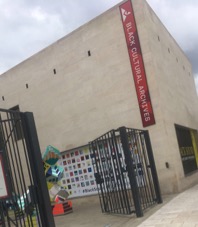
Black Cultural Archives: This is the exterior of the building, which has interactive artwork celebrating important Black British figures.
Name: Kamara Simms
Class Year: 2019
Major: English
Minor: Africana Studies
Hometown: London, United Kingdom
Internship Placement: Black Cultural Archives
Job Title: Exhibition Guide
Location: London, United Kingdom
What’s happening at your internship?
My internship has been very research-focused, and I have had the opportunity to research some incredible people and topics pertaining to Black British history. I’ve spent much of my time in the reading room and archives, satiating my want to know more about the history of Black people in my country. I have used my research to assist Black Cultural Archives’ marketing manager in promoting BCA through social media and their website. I’ve also worked very closely with BCA’s “Black Sound” exhibition, which showcases a timeline of Black British music and pays homage to its legacy and impact. I’ve created databases, contacted influential artists and conducted interviews. Furthermore, I’ve had the opportunity to experience the community that BCA fosters through working in the café and attending their evening events and themed days. My favourite has been “The Poet’s Corner,” which is their spoken word event hosted every Wednesday evening.

Windrush Square, just outside of Black Cultural Archives: In this photo, I am standing in front of the newly established memorial honouring Caribbeans and Africans who fought for the British Commonwealth during World War I and World War II.
Why did you apply for this internship?
I am very interested in identity politics pertaining to race, and I wanted to learn more about Black British history. Academically, my work lies in identity politics and literature of the African diaspora, and I am a firm believer that one cannot navigate the process of conceptualising and understanding blackness without first understanding the history of black people. As such, volunteering at the Black Cultural Archives, the UK’s first dedicated Black heritage centre, seemed like an excellent way to spend my summer.
What has been your favorite part of this internship?
My favourite part of this internship has been researching the extensive archive collection of Black British history housed at the Black Cultural Archives.
I learnt about an incredible Black British feminist named Olive Morris. She was a young Jamaican community leader and activist, who advocated for education and healthcare rights, and fought against police brutality. However, she is best known for standing up for squatters rights and tackling poor housing conditions for black people. Many immigrant communities were discriminated against in the UK in regards to housing, with many landlords advertising “No Blacks, No Dogs, No Irish” in the windows of their properties. Olive Morris led the Organisation for Women of African and Asian Descent (OWAAD) to tackle such issues from the grassroots level. I was able to look through periodicals and pamphlets written by the organisation, and even found unpublished original works of poetry by Black women at the time addressing feelings of displacement, which really resonated with me. I was conducting this research around the time of the Grenfell Tower fire in West London, which tragically drew attention to the poor housing conditions for the working class in Britain, disproportionately affecting people of colour, so learning about a young Jamaican woman advocating to improve the poor housing conditions of the Black working class in the 1980s definitely allowed me to see why learning the history of my country was so important for the present. As a Black British woman of Jamaican heritage, this is very much my history.
To learn more about Olive Morris, I wrote about her for the Black Cultural Archives’ website: bcaheritage.org.uk/in-remembrance-of-olive-morris-olivemorrisday

“Black Sound” pop-up exhibition: This exhibition, located in BCA’s café, highlights the importance of UK Garage and the legacy of Black British music. I helped to install the artwork on the table!
What is most rewarding about your internship?
I get to work in an incredibly diverse workplace with a majority of black women on its staff, who are committed to uplifting the voices of black people. Black Cultural Archives sheds light on hidden figures in history whose contributions are often silenced. It has created a home in London that supports the efforts of black people past, present and future, and is dedicated to providing a space for black people to excel. It feels absolutely wonderful to be a part of this and learn from such passionate people. The myth that Black is monolithic is truly dismantled in this work environment, and the black body is recognised as more than its racialised subjugation. We are valued and we are empowered as the creatives, intellectuals, and forward-thinkers that we are. I feel privileged that I was given the opportunity to work here for the summer, and am definitely interested in continuing to volunteer here in the future.
